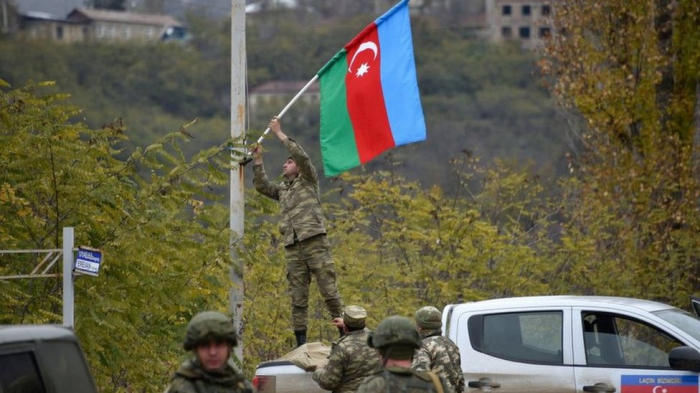One of the most significant developments in the Armenia-Azerbaijan peace process since the end of the Second Karabakh War occurred on July 19 when the Secretary of the Security Council of Armenia, Armen Grigoryan, in an interview with local media, declared that Armenia will withdraw its armed forces from Karabakh . According to him, his country has already started this process and plans to finalize it in September. This, if this time it is implemented, would be a notable contribution to the Armenia-Azerbaijan negotiations. However, the fact that the separatist forces in Karabakh remain armed, and Armenian troops helped them install military fortifications over the period since the end of the war constitutes a formidable threat to regional peace and security.
The continued presence of the Armed Forces of Armenia in the Azerbaijani territories following the war has been a top issue on the agenda of negotiations. Armenia’s refusal to pull out its troops in violation of the fourth article of the trilateral [Armenia, Azerbaijan, and Russia] statement of November 10, 2020, caused deep distrust and tensions between the sides. The Azerbaijani government regularly called upon Armenia and Russia to ensure the implementation of this obligation. The latest such a message was given by President Aliyev a few days before Grigoryan’s announcement in a speech in which he criticized both countries for failing to honour the commitments they have undertaken.
The pull out of the Armenian troops from the region would, first of all, be a big step toward the normalization of the Armenia-Azerbaijan relations on the basis of mutual recognition of each other’s territorial integrity and other norms of the international law. Until now, although Armenia’s leaders regularly denied any claims to Azerbaijani territories, they maintained units of the Armenian Armed Forces on Azerbaijani soil. This contradiction between the deeds and words of the Armenian leadership has so far prevented any meaningful progress in the peace negotiations since the 2020 war. Therefore, the withdrawal of the troops from Karabakh would help to overcome another major obstacle towards the normalization of relations, and the signing of a peace treaty in line with t international law and norms.
This is also of great importance for other dimensions of the peace negotiations. The implementation of one more article of the trilateral statement would help the realization of other elements envisaged in this document. For example, the Armenian side has yet to start to make any major practical steps towards the construction of the railroads and highways that would constitute part of the larger transportation network that is planned . The existence of more positive environment between the sides is likely to positively impact this process as well.
The decision announced by Armen Grigoryan, more precisely its context, tells also about the situation vis-à-vis Russia’s role in the peace process. According to both Baku and Yerevan, Russia played a major mediating role in the adoption of the latest decision by the Armenian side. For President Aliyev, it was a senior official from Russia’s Ministry of Defense who promised to the Azerbaijani side in a visit a few months ago that Armenia would withdraw its armed forces from Azerbaijani soil by June this year. This demonstrates that, although the European Union has boosted its role in the Armenia-Azerbaijan peace process over the recent months, Russia is still a major actor in this context that can affect the fate of the negotiations and prospects for an eventual peace agreement.
Russia’s role is buttressed by several facts, among others, those related with the leaders of the separatist groups in the part of the Karabakh region where Russian peacekeepers have been deployed: The separatist leaders are not happy with the Armenia-Azerbaijan peace negotiations and the role of the EU in this process; They are armed and have reinforced their military positions thanks to the Armenian troops that remained in this region after the 2020 war; They are Russia-aligned and often call for annexation of the region into the Russian Federation rather than return under the jurisdiction of Azerbaijan. These factors seriously complicate Azerbaijan’s efforts to restore its control over the region. For example, in the days following Grigoryan’s announcement, the Azerbaijani side continued to report that the Armenian armed forces conduct engineering, technical, and construction work to establish combat positions in the Karabakh region. This causes occasional armed escalations, but can trigger even a larger confrontation if if illegal armed formations remain in the region.
For now, the negotiations between Baku and Yerevan appear to be moving on the right path towards peaceful resolution of these disputes. We can now expect that the leaders of Armenia and Azerbaijan will meet in the near future, as envisioned by the Brussels summit on May 22. The announcement made by Armen Grigoryan has likely positively affected the negotiations behind closed doors between the sides, and helped the preparations for the next summit of the leaders. In parallel, there is now likely a more constructive atmosphere also for the second meeting of the border delimitation commissions, planned to be held in August in Moscow.
For peace and security in the South Caucasus, it is vitally important that this positive atmosphere is preserved, the commitments undertaken in the trilateral statement are fulfilled, and that this unique historic chance for peace and reconciliation between Armenia and Azerbaijan is not taken for granted.
Vasif Huseynov is Head of Department at the Baku-based Center of Analysis of International Relations (AIR Center).
More about: Azerbaijan Armenia Russia
















































